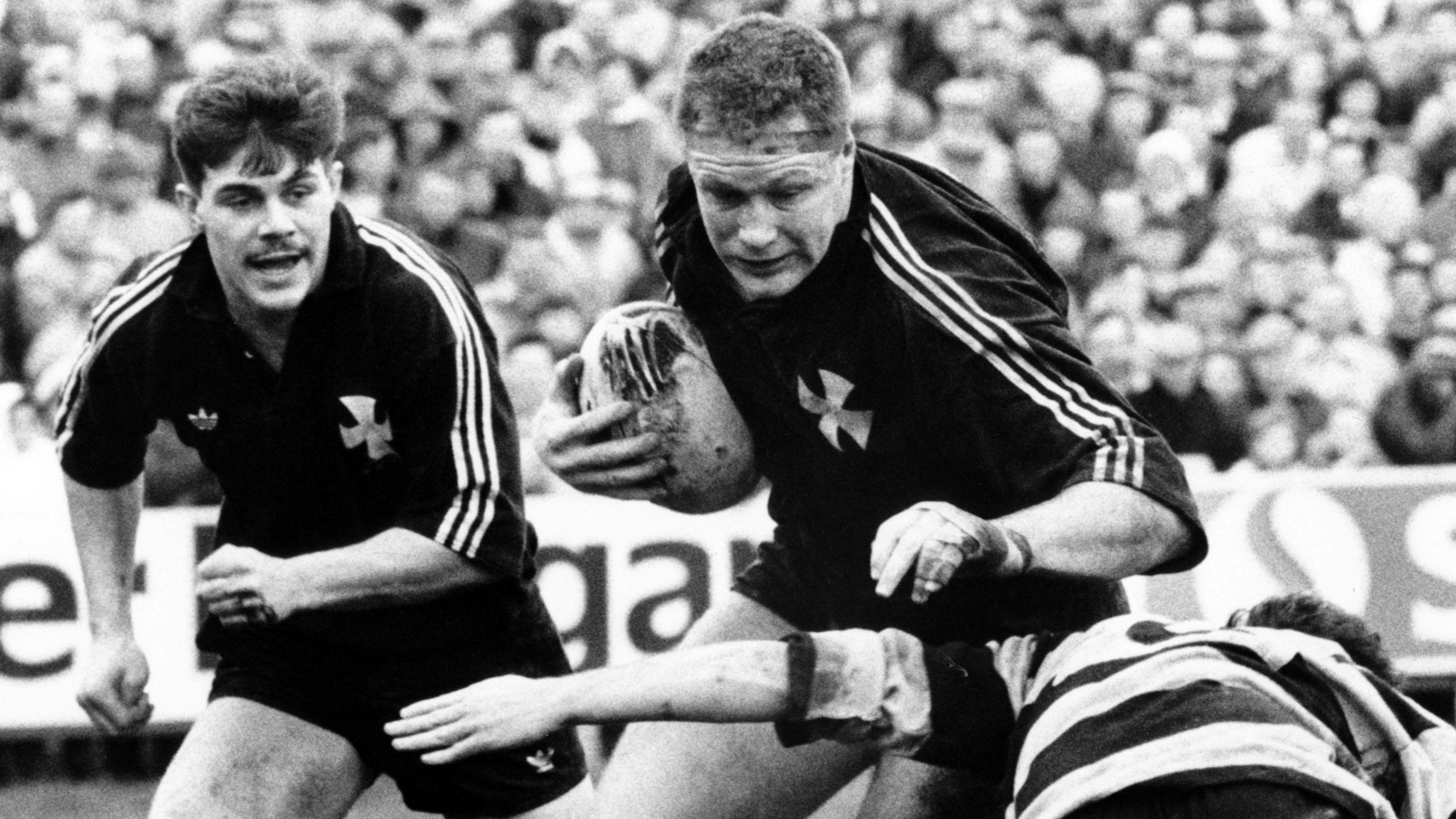Wales dual-code forward Jones dies aged 59

Mark Jones (centre) rose to prominence as a number eight with Neath in the 1980s
- Published
Former Wales dual-code rugby international Mark Jones has died at the age of 59.
Wales Rugby League said Jones died of a heart attack while at a gym in the Middle East.
Jones began his senior rugby career in union with local side Tredegar Ironsides before joining Tredegar RFC, then on to Neath in 1985 - at the time one of the powerhouses of Welsh rugby.
Neath said news of the death of their former player had left the club "heartbroken" and paid tribute to "a real force of nature".
The number eight began establishing his reputation as one of the 'hard men' of the game while at Neath, and during his career in both codes he was sanctioned regularly for violent conduct on the field.
That disciplinary record did not harm his international chances though, and Jones played 15 times for Wales between 1987 and 1990 before switching to rugby league with Hull.
He made his Wales bow in union against Scotland at Murrayfield in March 1987, aged just 21, scoring a late try on debut in a 21-15 defeat.
After switching codes to league in October 1990 - part of a Welsh exodus as players from the amateur union game flocked to the professional code - Jones suffered a series of ankle injuries that initially limited his time on the pitch for Hull.
His talent eventually shone through and Jones won 11 caps for Wales in the 13-man game, including two during a famous 1995 World Cup campaign where Wales reached the semi-finals. He also represented Great Britain, playing one game against France in February 1992.
After four years with Hull, featuring at prop and second row, Jones played for a season at Warrington before returning to union with Ebbw Vale.
His period with the Steelmen proved the most notorious of his career, including a famous brawl with Swansea's Wales prop Stuart Evans that saw both men banned for four weeks.
Then in the 1998-99 league season against Pontypridd, Jones landed a punch on a young Ian Gough that left the future Wales star needing surgery on his eye socket. Another three-week ban followed his sending-off by referee Derek Bevan.
Despite his transgressions, Jones earned a Wales recall and won his 15th and final cap as a lock against Zimbabwe in June 1998, a few days before turning 33.
He played for Pontypool and Aberavon before the end of his career and after hanging up his boots, Jones went on to work as a lab technician in an international school for an oil company in the Middle East.
His time at the school saw Jones become involved in rugby coaching.
In 2023, Jones reflected on his turbulent career by releasing his autobiography Fighting To Speak.
In the book, he candidly explained how his ongoing struggle with a debilitating stammer had made him "very anxious, full of self-loathing and hate", and how rugby gave him the chance to release that rage on the field.
'Uncompromising and a gentleman'
Former Neath, Llanelli and Wales flanker Lyn Jones was among those to pay tribute to his former team-mate.
Lyn Jones told BBC Radio Wales: "Mark was a gentleman... after playing for Tredegar Mark came down for six or seven seasons at the Gnoll and we formed a really good partnership in the back row.
"He was a very uncompromising character on the field, Mark, and a real pleasure to play with, but not against, unfortunately, for lots of other people."
Lyn Jones said Mark Jones' autobiography "was a real, honest appraisal on himself" which "helped him put his whole life out in front there, and became his legacy, really".
Former Ospreys coach Jones added: "He was able to correct himself in many ways and get over his speech impediment because of it. And, you know, getting to know him the last two years, having been away for a long time, was a delight."
Clive Griffiths, who coached Jones for a number of years with the Wales league side, told the Wales Rugby League website: "Scooby was a giant in both codes, and the fact that he went on to play for Great Britain as well speaks volumes for his ability as a player.
"He was part and parcel of that great era of Welsh rugby league until rugby union went back professional in 1995. From 1991-95, he was an ever-present in the Welsh squad.
"Everybody loved him as a man first and foremost. I recently read his book and it's just so interesting to read about his life.
"For me, it's like losing one of the family. We're so tight as a group, the team of 1995, and we're always in touch. It's difficult to explain the depth of feeling from that group of players right now.
"He always called me boss, right up until now. He was a brilliant man, one of the best and that's why he was loved so much."